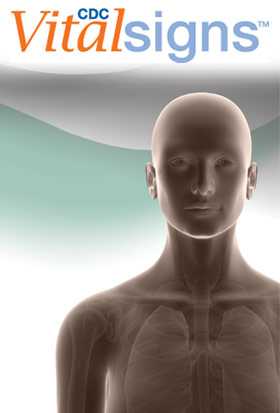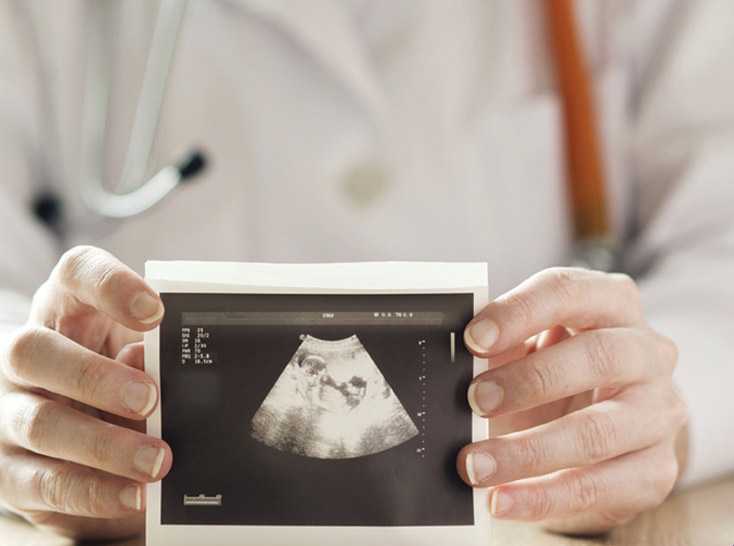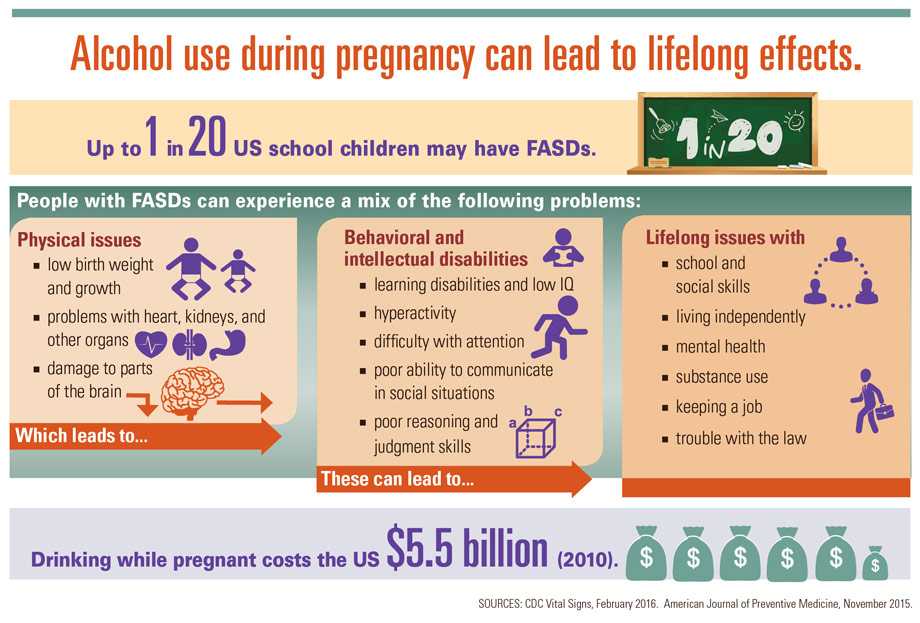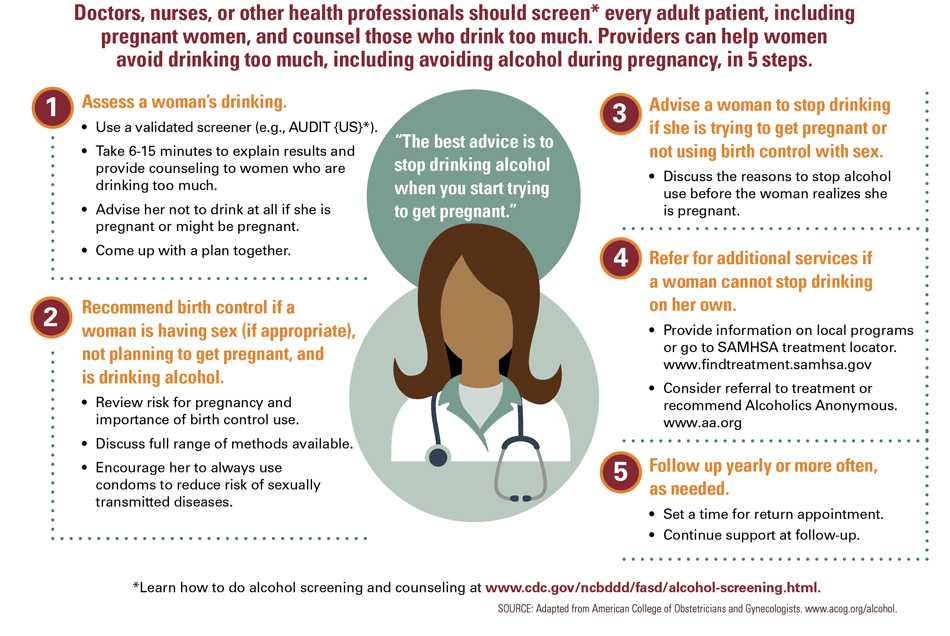Alcohol and Pregnancy
Why take the risk?
Overview
Alcohol use during pregnancy can cause fetal alcohol spectrum disorders (FASDs), which are physical, behavioral, and intellectual disabilities that last a lifetime. More than 3 million US women are at risk of exposing their developing baby to alcohol because they are drinking, having sex, and not using birth control to prevent pregnancy. About half of all US pregnancies are unplanned and, even if planned, most women do not know they are pregnant until they are 4-6 weeks into the pregnancy. This means a woman might be drinking and exposing her developing baby to alcohol without knowing it. Alcohol screening and counseling helps people who are drinking too much to drink less. It is recommended that women who are pregnant or might be pregnant not drink alcohol at all. FASDs do not occur if a developing baby is not exposed to alcohol before birth.
Women can:
- Talk with their health care provider about their plans for pregnancy, their alcohol use, and ways to prevent pregnancy if they are not planning to get pregnant.
- Stop drinking alcohol if they are trying to get pregnant or could get pregnant.
- Ask their partner, family, and friends to support their choice not to drink during pregnancy or while trying to get pregnant.
- Ask their health care provider or another trusted person about resources for help if they cannot stop drinking on their own.


Problem
Alcohol can harm a developing baby before a woman knows she is pregnant.
Why take the risk?
- Women who are pregnant or who might be pregnant should be aware that any level of alcohol use could harm their baby.
- All types of alcohol can be harmful, including all wine and beer.
- The baby’s brain, body, and organs are developing throughout pregnancy and can be affected by alcohol at any time.
- Drinking while pregnant can also increase the risk of miscarriage, stillbirth, prematurity, and sudden infant death syndrome (SIDS).
Doctors, nurses, or other health professionals can help prevent alcohol use during pregnancy in 5 ways:
- Provide alcohol screening and brief counseling to all women.
- Recommend birth control to women who are having sex (if appropriate), not planning to get pregnant, and drinking alcohol.
- Advise women who are trying to get pregnant to stop drinking alcohol.
- Refer for additional services for women who cannot stop drinking on their own.
- Follow up yearly or more often, as needed.
Infographic
What Can Be Done
The Federal government is
We know what works.
The Guide to Community Preventive Services (Community Guide) gives communities tools and policies that work to prevent too much drinking for everyone.
Learn more at: www.thecommunityguide.org/alcohol
- Requiring most health insurance plans to cover recommended alcohol screening and counseling services without cost to the patient.
- Requiring most health insurance plans to cover FDA-approved methods of birth control and patient education and counseling as prescribed by a health care provider for women of reproductive age without cost to the patient.
- Adopting clinical guidelines to carry out alcohol screening and counseling in community health centers.
- Working with partner organizations to promote alcohol screening and counseling.
Women can
- Talk with their health care provider about their plans for pregnancy, their alcohol use, and ways to prevent pregnancy if they are not planning to get pregnant.
- Stop drinking alcohol if they are trying to get pregnant or could get pregnant.
- Ask their partner, family, and friends to support their choice not to drink during pregnancy or while trying to get pregnant.
- Ask their health care provider or another trusted person about resources for help if they cannot stop drinking on their own.
Health care providers can
We know how practices can implement alcohol screening and counseling.
CDC has a guide to help staff in any primary care practice to plan and implement alcohol screening and counseling.
Learn more at: www.cdc.gov/ncbddd/fasd/alcohol-screening.html
- Screen all adult patients for alcohol use at least yearly
- Advise women not to drink at all if there is any chance they could be pregnant.
- Counsel, refer, and follow up with patients who need more help
- Use the correct billing codes so that alcohol screening and counseling is reimbursable
State and local governments can
- Work with their Medicaid programs to make sure alcohol screening and counseling services are reimbursable.
- Encourage health insurance plans and provider organizations to support alcohol screening and counseling.
- Monitor how many adults are receiving these services in communities.
- Support proven policies and programs that work to prevent drinking too much.
Issue Details
Related Pages
- Vital Signs Issue details: Alcohol-Exposed Pregnancies — United States, 2011–2013, Morbidity and Mortality Weekly Report (MMWR)
- Vital Signs – Alcohol and Pregnancy [PODCAST – 1:15 minutes]
- Vital Signs – Alcohol and Pregnancy [PSA – 0:60 seconds]
- CDC Fetal Alcohol Spectrum Disorders
- CDC Brochure: An Alcohol-free Pregnancy is the Best Choice for Your Baby
- CDC Alcohol Screening and Brief Intervention
- CDC Alcohol Screening and Brief Intervention Implementation Guide
- CDC Alcohol and Public Health
- CDC – Fetal Development Chart [PDF 1.76Mb]
Other Sites
- MedlinePlus – Fetal Alcohol Spectrum Disorders
- MedlinePlus – Pregnancy and Substance Abuse
- National Organization on Fetal Alcohol Syndrome (NOFAS)
- The American Congress of Obstetricians and Gynecologists – Alcohol
- American Academy of Pediatrics – Fetal Alcohol Spectrum Disorders Toolkit
- American College of Nurse-Midwives – Alcohol and Pregnancy
- The Arc’s FASD Prevention Project
- NIH’s National Institute on Alcohol Abuse and Alcoholism (NIAAA)
- NIH/NIAAA Fact Sheet: Fetal Alcohol Exposure
- NIH/NIAAA – Rethinking Drinking: Alcohol & Your Health
- NIH/NIAAA – Helping Patients Who Drink Too Much: A Clinician’s Guide
- SAMHSA – A Treatment Improvement Protocol: Addressing Fetal Alcohol Spectrum Disorders – Tip 58
- SAMHSA FASD Center for Excellence
- SAMHSA Treatment Facility Locator
- SAMHSA Coding for Screening and Brief Intervention Reimbursement
- Page last reviewed: February 2, 2016
- Page last updated: February 2, 2016
- Content source:
Error processing SSI file


 ShareCompartir
ShareCompartir

